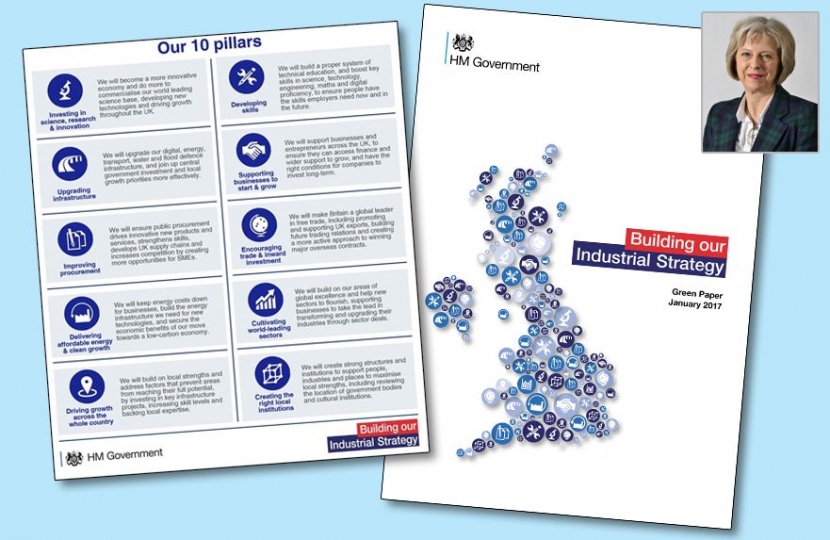
The government unveiled its industrial strategy for the UK in a Green Paper* on 23 January 2017.
It is based on 10 pillars:
1. Investing in science, research and innovation – we must become a more innovative economy and do more to commercialise our world leading science base to drive growth across the UK.
2. Developing skills – we must help people and businesses to thrive by: ensuring everyone has the basic skills needed in a modern economy; building a new system of technical education to benefit the half of young people who do not go to university; boosting STEM (science, technology, engineering and maths) skills, digital skills and numeracy; and by raising skill levels
in lagging areas.3. Upgrading infrastructure – we must upgrade our standards of performance on digital, energy, transport, water and flood defence infrastructure, and better align central government infrastructure investment with local growth priorities.
4. Supporting businesses to start and grow – we must ensure that businesses across the UK can access the finance and management skills they need to grow; and we must create the right conditions for companies to invest for the long term.
5. Improving procurement – we must use strategic government procurement to drive innovation and enable the development of UK supply chains.
6. Encouraging trade and inward investment – government policy can help boost productivity and growth across our economy, including by increasing competition and helping to bring new ways of doing things to the UK.
7. Delivering affordable energy and clean growth – we need to keep costs down for businesses, and secure the economic benefits of the transition to a low-carbon economy.
8. Cultivating world-leading sectors – we must build on our areas of competitive advantage, and help new sectors to flourish, in many cases challenging existing institutions and incumbents.
9. Driving growth across the whole country – we will create a framework to build on the particular strengths of different places and address factors that hold places back – whether it is investing in key infrastructure projects to encourage growth, increasing skill levels, or backing local innovation strengths.
10. Creating the right institutions to bring together sectors and places – we will consider the best structures to support people, industries and places. In some places and sectors there may be missing institutions which we could create, or existing ones we could strengthen, be they local civic or educational institutions, trade associations or financial networks.
The Rt Hon Greg Clark MP, Secretary of State for Business, Energy & Industrial Strategy, writes¶:
This is an important moment for the United Kingdom.
As we prepare to leave the European Union, we must look forward and plan the long term policies and decisions which will shape how we earn a prosperous living in the years ahead.
Today’s Green Paper, Building our Industrial Strategy, is part of an open dialogue to develop this strategy as the enduring foundation of an economy that works for everyone.
We start from a position of considerable strength. We are the fifth biggest economy in the world, despite having the 22nd highest population. We have achieved higher levels of employment than ever before in our history – in fact 2.7 million more than in 2010.
We have businesses, research institutions and cultural achievements at the very forefront of global excellence. And for all these reasons, we attract investment and talented individuals from around the world.
But there are challenges that the UK must face up to, now and in the years ahead – our excellence in key technologies, professions, research disciplines and institutions provides us with crucial competitive advantages. However, we can’t take them for granted.
If other countries invest more in research and development, and we do not, we cannot expect to keep, let alone extend, our technological lead in key sectors – or the world-beating performance of our universities.
The same goes for our record as Europe’s leading destination for inward investment or our position as a centre of international finance. Our competitors are not standing still. They are upgrading infrastructure networks and reforming systems of governance. Therefore we too must strive for improvement.
In industrial sectors – from automotive and aerospace to financial and professional services and the creative industries – the UK has built a global reputation. But the competition for new investment is fierce and unending. The conditions that have allowed UK investment destinations to succeed include the availability of supportive research programmes, relevant skills in local labour markets and capable domestic supply chains.
For continuing success, these foundations must be maintained and strengthened. We must ensure every place meets its potential by working to close the gap between our best performing companies, industries, places and people and those which are less productive.
In a world containing so much uncertainty, public policy should aim to be a countervailing force for stability, not an additional source of unpredictability.
Whether in the public or private sector, investors need a stable policy framework against which they can make confident, long-term decisions. So our aim is to establish an industrial strategy for the long term.
To do that requires developing an enduring industrial strategy with, and not just for, the nations, communities and enterprises of the United Kingdom.
That is why this is a Green Paper – a set of proposals for discussion and consideration, and an invitation to all to contribute collaboratively to their development.
* A copy of the Green Paper can be downloaded here.
¶ The full text of Mr Clark's 'Dear Colleague' letter can be downloaded here.

